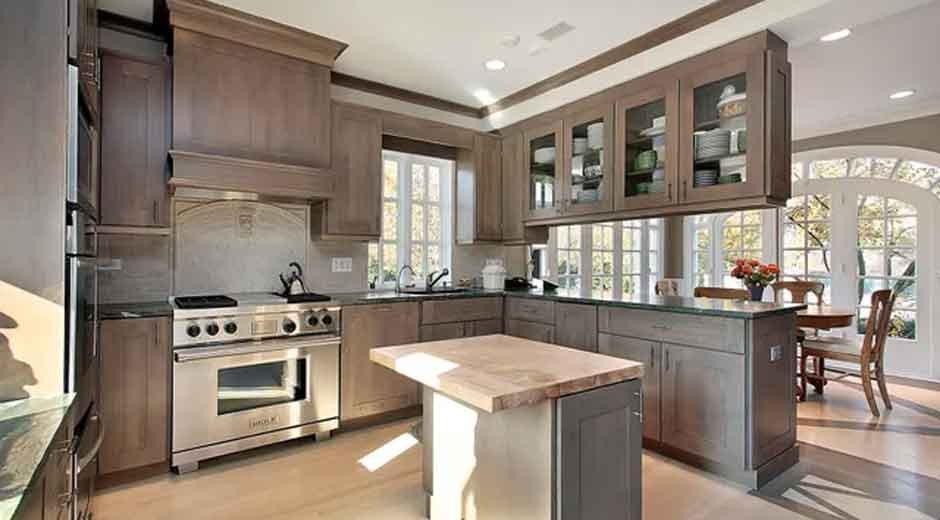Skip to the good bit
ToggleA kitchen renovation presents an opportunity to create a space that is not only functional and stylish but also environmentally responsible. With sustainability becoming a top priority for homeowners, integrating eco-friendly elements into kitchen renovations can reduce your carbon footprint, lower energy bills, and contribute to a healthier living environment. From energy-efficient appliances to sustainable materials, here’s how you can transform your kitchen into a green, high-performing space.
1. Choosing Sustainable Materials for Cabinets and Countertops
The materials you select for your kitchen significantly impact sustainability. Opting for renewable, non-toxic, and recycled materials can minimize environmental harm.
- Cabinets:Consider FSC-certified wood, reclaimed timber, or bamboo. These materials are responsibly sourced and help reduce deforestation.
- Countertops:Recycled glass, reclaimed wood, and composite materials made from post-consumer waste provide durable and eco-friendly alternatives.
- Low-VOC Finishes:Volatile organic compounds (VOCs) in paints, stains, and adhesives release harmful toxins. Opt for low-VOC or water-based finishes to improve indoor air quality.
2. Energy-Efficient Appliances That Reduce Consumption
Upgrading to energy-efficient appliances is one of the most effective ways to cut down on electricity and water usage.
- ENERGY STAR Certified Appliances:Look for refrigerators, dishwashers, and ovens with this certification, ensuring they meet high energy efficiency standards.
- Induction Cooktops:Compared to traditional gas or electric stoves, induction cooktops use electromagnetic energy, reducing heat waste and improving efficiency.
- Smart Refrigerators:These appliances optimize temperature settings and reduce energy waste while offering convenience through connectivity features.
3. Sustainable Flooring Options for a Greener Kitchen
Flooring plays a crucial role in an eco-friendly renovation. The right materials can offer durability while being environmentally responsible.
- Cork Flooring:Harvested from tree bark without cutting down the tree, cork is sustainable, soft underfoot, and provides excellent insulation.
- Bamboo Flooring:Rapidly renewable and highly durable, bamboo is an ideal choice for eco-conscious homeowners.
- Reclaimed Hardwood:Salvaged from old buildings and barns, reclaimed wood offers character and sustainability.
4. Water-Saving Fixtures and Plumbing Solutions
Reducing water waste in the kitchen is a crucial aspect of sustainable renovations. High-efficiency fixtures and smart plumbing solutions can significantly cut down on water consumption.
- Low-Flow Faucets:These faucets use aerators to reduce water usage while maintaining pressure.
- Touchless Faucets:By limiting unnecessary water flow, motion-sensor faucets help conserve water efficiently.
- Energy-Efficient Dishwashers:Modern dishwashers use significantly less water than hand-washing, especially when running full loads.
5. Maximizing Natural Light and Ventilation
A well-lit and properly ventilated kitchen reduces reliance on artificial lighting and enhances air quality.
- Skylights and Larger Windows:Increasing natural light lowers energy costs and creates an inviting ambiance.
- LED Lighting:If artificial lighting is necessary, LED bulbs consume less energy and last longer than traditional incandescent bulbs.
- Range Hoods and Ventilation Systems:Proper ventilation reduces indoor air pollution and improves air circulation.
6. Smart Storage Solutions to Minimize Waste
Efficient storage systems not only improve organization but also contribute to sustainable living by reducing clutter and food waste.
- Pull-Out Recycling and Composting Bins:Easy access to waste sorting encourages responsible disposal habits.
- Glass and Stainless Steel Containers:Ditch plastic storage in favour of reusable and non-toxic alternatives.
- Modular Shelving and Vertical Storage:Utilizing vertical space reduces the need for additional cabinetry, preserving resources.
7. Eco-Friendly Paints and Finishes for a Healthy Home
The chemicals used in traditional paints and finishes can release harmful toxins, affecting indoor air quality.
- Milk Paint and Natural Paints:These contain no synthetic chemicals and are biodegradable.
- Clay and Lime Wash Paints:These options provide beautiful finishes while being VOC-free.
- Beeswax and Natural Oils for Wood Finishes:These non-toxic finishes are ideal for wooden surfaces and contribute to healthier indoor air.
8. Investing in Sustainable and Local Craftsmanship
Supporting local artisans and sustainable brands can reduce the environmental impact of your renovation.
- Locally-Sourced Materials:Using materials from nearby suppliers reduces transportation emissions and supports the local economy.
- Handcrafted Cabinetry:Small-scale, sustainable production results in higher quality and less environmental waste.
- Upcycled and Repurposed Elements:Reusing existing kitchen features, such as repurposing old doors into shelving, keeps materials out of landfills.
For homeowners considering kitchen renovations in Victoria, incorporating eco-friendly upgrades is a forward-thinking investment. Sustainable choices not only reduce environmental impact but also create a healthier, more efficient home. Whether it’s choosing energy-efficient appliances, sustainable materials, or water-saving fixtures, these upgrades align with modern green living while enhancing the aesthetic and functionality of your space.
By taking an eco-conscious approach to your kitchen renovation, you contribute to a more sustainable future while enjoying the long-term benefits of a cost-effective, energy-efficient home.







